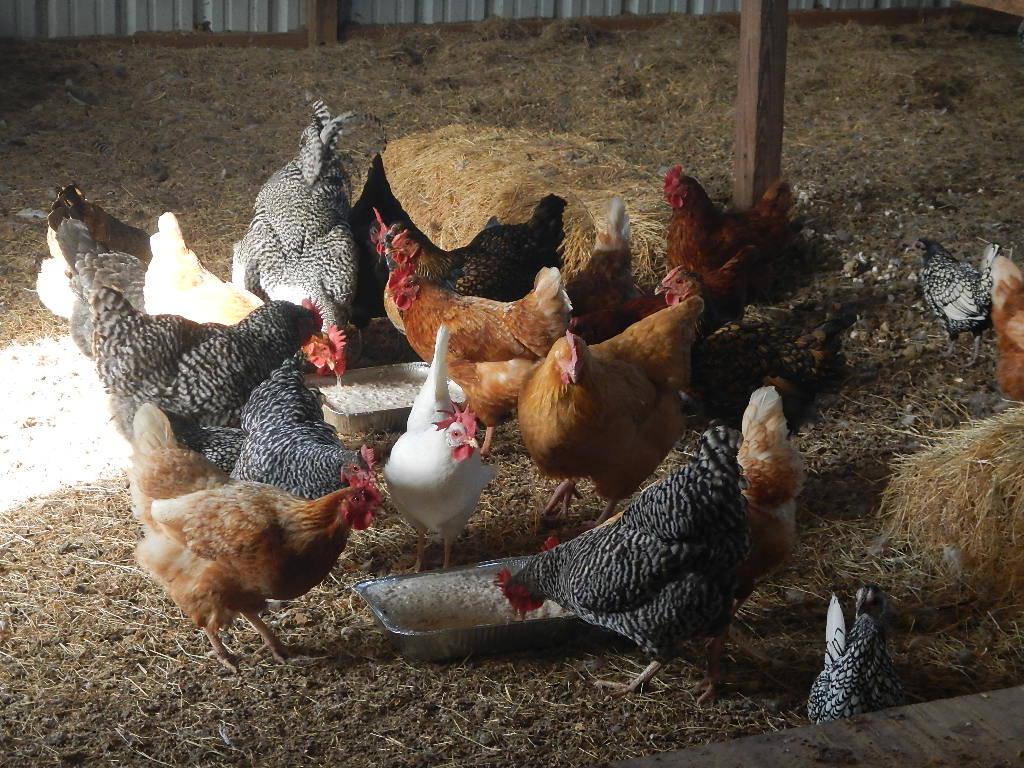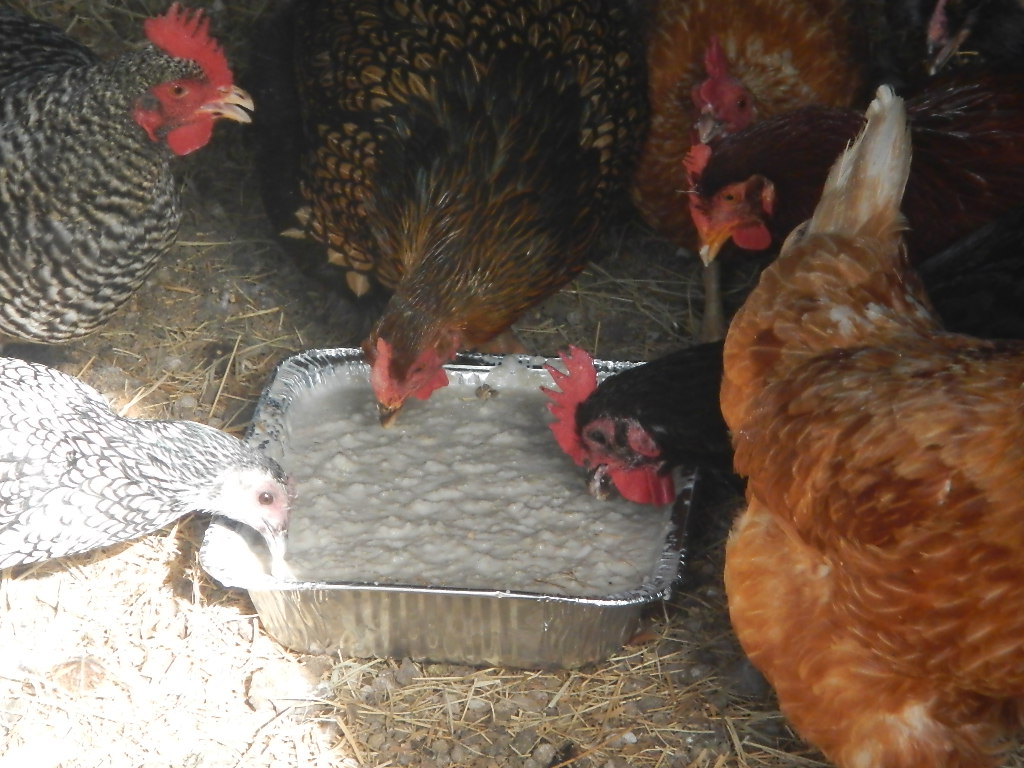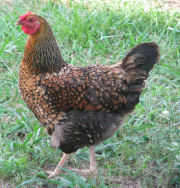 Dottie
Dottie Here in the south where we live, there are not many times in the winter when you have to think deeply about how to protect your fine feathered friends, since it is rare to experience temperatures lower than 20 degrees. As of this writing however, we had a record low of 11 degrees last night and we are expecting temperatures to be around 17 tonight. I must admit that I am not fond of cold weather and so glad that I do not live any further north than I already do.
Sadly, I must say that last night, I lost one of my girls and will say goodbye to my sweet little tenacious Golden Laced Wyandotte (pictured). She has been with me for 3 years now and donated many eggs to my table. I always hate to lose a good egg layer and especially since my chickens are also my pets as well, then there is a deeper loss. I always feel bad when I lose a hen, and wonder if there was something more I could have done.
Sadly, I must say that last night, I lost one of my girls and will say goodbye to my sweet little tenacious Golden Laced Wyandotte (pictured). She has been with me for 3 years now and donated many eggs to my table. I always hate to lose a good egg layer and especially since my chickens are also my pets as well, then there is a deeper loss. I always feel bad when I lose a hen, and wonder if there was something more I could have done.
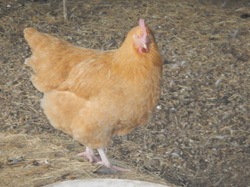 Daisy
Daisy Since my chickens are in an extremely large barn, then it is next to impossible to add artificial heat, however after last night, I am beginning to think of ways to enclose a small section to run them into when we have rare nights like this. It was difficult to sleep myself last night, wondering how my little hens would fare in the weather, so I jumped out of bed this morning, and ran right to the kitchen to make a batch of warm oatmeal to carry to them.
Walter had gone up earlier to carry them some water, since the water that was there was frozen. He came back and reported that we lost one hen. Since losing only one out of 25, I suspect that she had another issue going on and that the cold weather was just the "straw that broke the camel's back" so to speak.
Walter had gone up earlier to carry them some water, since the water that was there was frozen. He came back and reported that we lost one hen. Since losing only one out of 25, I suspect that she had another issue going on and that the cold weather was just the "straw that broke the camel's back" so to speak.
| Pictured here is my flock gathered round the trays of warm oatmeal that I made for them this morning. If you do this, please make sure that it is not too hot and not burn their mouths (beaks) It's not too much to do for them, since they do make our breakfast every morning as well. Another benefit of the oatmeal is that it will provide more hydration than just dry scratch grain. |
| Here are some cold weather tips for all my chicken friends who want to protect their flock, too. 1. Make sure that water is a priority. They cannot get adequate water while waiting on their frozen water dish to thaw. In freezing temps, carry water to them several times a day replacing the frozen block of water. If this is too much of a chore, then consider an electric water heater like I have pictured from Amazon. The top is advertised as not getting too hot but barely warm enough to keep water from freezing. It is to be used in inside the coop in a dry area. It is thermostatically controlled and prevents water from freezing down to 10 degrees. If you don't have this equipment, then consider having two water dishes, one that you can bring home each time to thaw while the other is in use. | |
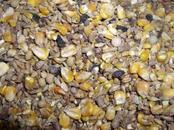
2. Boost their feed intake. Chickens can produce more body heat after eating scratch grains. But be sure not to make scratch grains their complete diet since there will be inadequate nutrition. Continue with their normal feedings, but just give them a little extra scratch feed in the cold days. This will provide more heat and also help them to put on a little more fat for the cold winter, which is also a protection from the weather.
And as mentioned above, carry them a little treat of homemade oatmeal. Adding milk to the oatmeal will also provide extra protein, and chickens seem to never get enough protein.
And as mentioned above, carry them a little treat of homemade oatmeal. Adding milk to the oatmeal will also provide extra protein, and chickens seem to never get enough protein.
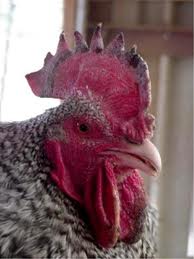
3. Protect combs and wattles. This is not my picture (click here for picture credit), but I'm including it to show you what frostbite looks like. Notice the dark areas on top of the comb and the the lower parts of the wattles. To protect against this, consider rubbing petroleum jelly on their combs and wattles.
Ah, you might say, "there is no way to catch all my chickens, it would create trauma for them." That is true, I agree, but the alternative will also create trauma for them if they endure frostbite. So here is a better way to catch them.
I've noticed that I can do anything that I need to do to my chickens after they go on the roost in the late evening. They are like "sitting ducks" so to speak and they do not fly or try to get away from you, so just go down the roost and rub some petroleum jelly on each one.
Ah, you might say, "there is no way to catch all my chickens, it would create trauma for them." That is true, I agree, but the alternative will also create trauma for them if they endure frostbite. So here is a better way to catch them.
I've noticed that I can do anything that I need to do to my chickens after they go on the roost in the late evening. They are like "sitting ducks" so to speak and they do not fly or try to get away from you, so just go down the roost and rub some petroleum jelly on each one.
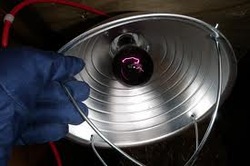
4. Keep the coop warm. Consider draftiness and how you can eliminate this, but remember that if closed too tightly then necessary oxygen may be depleted. Make sure their roost is wide enough so that they can crouch down onto their feet to keep warmer. I use a flat 2x4 so that their toes will be straight and then they can settle down onto their feet and legs. Never use metal roosts since this will be even colder. If your coop is small then surround the coop with many hay bales. Never add a heater to the coop that may allow a chicken to catch feathers on fire and burn down the whole building. This is tragic. If you do decide to add heat, you must be very careful not to create too much heat as this can also be stressful on the chickens. Put a thermometer on the roost somewhere to see how you added heat is effecting the temperature. Provide sunny areas out from under trees so that they can get into the sun as soon as possible.
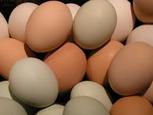
5. And finally, don't forget to gather your eggs regularly. Eggs can freeze just like their water freezes, and then you won't be able to enjoy them.
Aren't we blessed by God to have such amazing creatures as sweet little hens who provide us with EGGstravagant eggs for a healthy diet, one that provides many many nutrients. Check out this link on the benefits of eggs from The World's Healthiest Foods.
Do you have other ideas on how to keep the flock protected from the cold? Please leave your comments. Thanks!
Aren't we blessed by God to have such amazing creatures as sweet little hens who provide us with EGGstravagant eggs for a healthy diet, one that provides many many nutrients. Check out this link on the benefits of eggs from The World's Healthiest Foods.
Do you have other ideas on how to keep the flock protected from the cold? Please leave your comments. Thanks!
